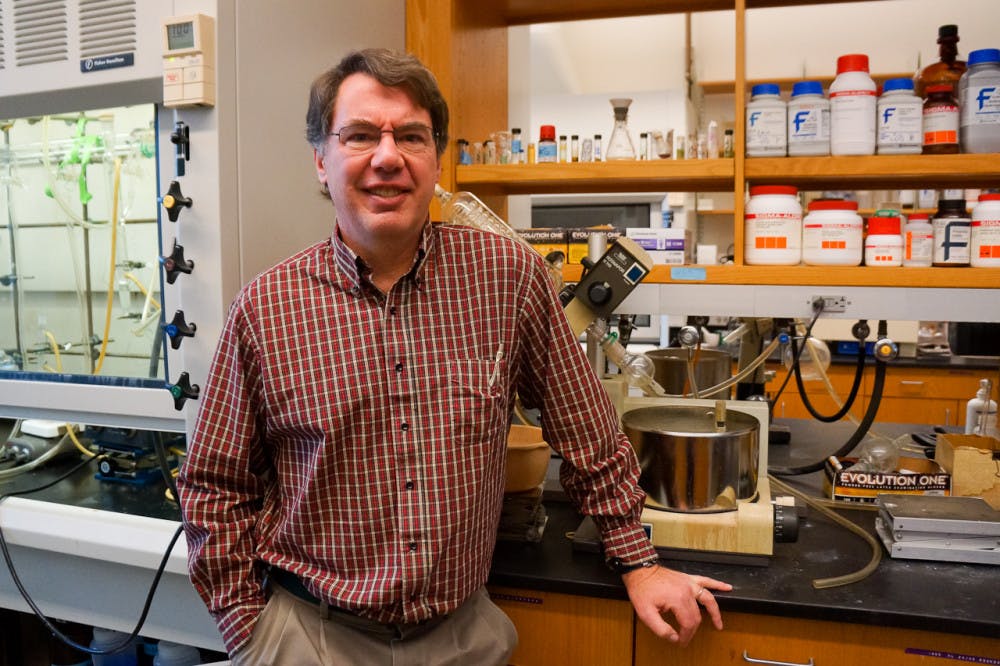Scale is one of the miracles of modern technology. The earliest computers took up entire rooms and had less computing power than the smart phones we now carry around in our pockets. But is this as good as we can get?
There are those who say no, it’s not. We can go smaller, faster, and more efficient.What if you could build a nanocircuit made out of molecular wires with only ahandful of atoms in each molecular component of the wire?
The technology is a long way off, but Phillip Battell/Sarah Stewart Professor of Chemistry and Biochemistry Jeff Byers and his thesis students Travis Stoll ’13 and Peter Hetzler ’14 are laying the groundwork.
Byers hasn’t always been thinking about nanowires. In fact, it’s an area he’s only recently moved into.
“A lot of the work that I did for about my first 25 years fell into the category of making small molecules — small molecules being things on the order of a dozen carbons, molecules that are used to make drugs or pesticides or for commercial purposes,” said Byers. “My work was driven more towards understanding processes rather than creating final products.”
In the early 2000’s, a chemist by the name of Robert H. Grubbs developed a specific type of catalyst that could polymerize (turn into a chain) the type of monomer (single-unit) molecule that Byers works with.
With the discovery of this catalyst, Byers began to think about potential applications for polymers made of his molecules.And he realized that the molecules that he had been working with — a class of carbon molecules containing chromium atoms – could potentially be used in nanowire construction.
“Nick Jansen ’05 was a thesis student of mine, and he was working on a project making some molecules for my old studies,” said Byers. “These molecules he was making were being used to test some of my mechanistic theories. But looking at them in a different light, I realized that molecules like that might be valuable building blocks for very different kinds of target-based synthesis, rather than process-based chemistry. What I realized is that some of the molecules that I was working with, with some slight changes and with some understanding of the mastery of this Grubbs catalyst approach to things, might be valuable as precursors for making polymeric materials because, frankly, some molecules very similar to what I was working with were precursors to polymeric materials.”
Think of the catalyst as the factory worker who assembles strands of Christmas tree lights. Byers thinks that his light bulbs, when assembled with this new catalyst, will make a nice strand of Christmas tree lights that will also have potential applications.
The Byers molecules are easily excited by visible light, which suggests they will make good conductors of electricity in polymer form.
They’re also relatively stable — some of them have been sitting around the lab for 10 years and have hardly changed. Both of these characteristics suggest that, in theory, the Byers molecules will be good candidates for molecular wires.
Hetzler and Stoll are playing around with two different versions of the Byers monomers to determine whether or not this theory will play out in reality.
“[Stoll] and I are essentially doing the same thing. I’m just working on making different light bulbs, with a different molecular formula,” said Hetzler.
“Ideally, I’d like to have a polymer made for my thesis project,” said Stoll. “If it works, someone else will have to pick up where I left off and find a way to analyze its conductivity. It’s a long-term project that will in all likelihood run through several thesis projects, but such is the nature of research.
But that doesn’t deter Byers.
“At the beginning of my career I took an area in organic synthesis, and now I’m one of the 30-40 people who took an area of modest importance and brought it to maturity — radicals in organic synthesis,” Byers said. “People know that’s what that guy at Middlebury does with a handful of undergraduates. People use some of the stuff I do. They completely ignore some of the other stuff I’ve done. But now I’ve been there and done that. I read the literature, and what I’m seeing now is that [my old work has] gotten to the stage where, largely due to the work of many of my good friends and to a minor degree me, a lot of the kinds of stuff that I wanted to prove in the 80’s and 90’s is now routine. Or as routine as its going to get. I could be routine for another 10 years. I don’t want to be. Coming into lab is still fun. I want to keep it that way.”
Listen to Professor Jeff Byers discuss his work with the Campus’ Will Henriques.




